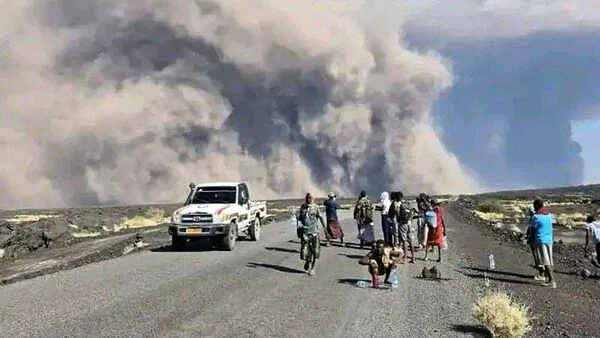
Ethiopia Volcano Eruption: Is Delhi, North India Still At Risk, Or Has The Threat Passed? IMD Shares Update
There was no lava, but thick plumes of smoke went up to 14 kilometres (nine miles) into the sky, the Toulouse Volcanic Ash Advisory Centre (VAAC) said. In videos shared on social media, which could not be verified immediately, a thick column of white smoke could be seen rising.
Also Read | Ethiopian volcano LIVE: Ash plumes completely out of India by 10:30 pm, IMD saysVolcanic ash drifted towards India around 11 pm on Monday and reached the skies over Gujarat, Delhi-NCR, Rajasthan, Punjab, and Haryana on Tuesday. This sparked concern about its impact on the weather and air quality over India.
More than 24 hours later, are Delhi and North India still at risk, or has the threat passed?
In its latest update, the India Meteorological Departmen was quoted by the Hindustan Times as saying that as of 10:30 pm on Tuesday, satellite imagery showed that the ash plume from the Ethiopian volcanic eruption had completely exited India.
The IMD had, in an earlier update, said the large ash plume produced by the volcanic eruption in Ethiopia had risen to around 45,000 feet - disrupting high-altitude flight corridors and triggering widespread cancellations.
Flight disruptionsAirlines cancelled dozens of flights scheduled to fly over affected areas. India's flag carrier, Air India, said it cancelled 11 flights, most of them international, on Monday and Tuesday to inspect aircraft that may have flown over affected areas, acting on a directive from India's aviation safety regulator.
Another Indian operator, Akasa Air, said it had cancelled flights to Middle East destinations such as Jeddah, Kuwait, and Abu Dhabi scheduled over the past two days.
Also Read | Ethiopian volcanic ash reaches Delhi - Should you be worried about your health?At least seven international flights scheduled to depart from and arrive at the Indira Gandhi International Airport in the Indian capital of New Delhi were cancelled on Tuesday, while at least a dozen were delayed, according to an official at the airport.
Did Ethiopia's volcanic ash impact weather of air quality?Experts noted that ash clouds from Ethiopia's Hayli Gubbi volcanic eruption affected aviation, but not local weather or air quality.
Mrutyunjay Mohapatra, Director General of Meteorology at the India Meteorological Department (IMD), said the impact remained limited to higher levels.
Also Read | Silent for 12,000 years, Ethiopia's volcano erupts, spews ash towards India, Pak"The impact of this volcanic ash is being seen only in the upper troposphere, and it is affecting the flight operations. It has no impact on air quality and weather. Our estimate is that this volcanic ash will completely move towards China by evening," he told news agency ANI.
He explained that international flights typically operate between 35,000 and 40,000 feet, while domestic services fly between 25,000 and 33,000 feet, adding that the volcanic ash was being observed "in the upper troposphere" over Indian airspace.
'Residents were coughing'An official in charge of health in northern Ethiopia's Afdera district, Abedella Mussa, said residents were coughing and mobile medical services from the larger Afar region had been launched in the remote area.
“Two medical teams have been dispatched to the affected kebeles (neighbourhoods) like Fia and Nemma-Gubi to provide mobile medical services,” he was quoted by the Associated Press as saying.
Also Read | Turkey-Brokered Deal Spurs Thaw in Somalia, Ethiopia RelationsAnother official in charge of livestock, Nuur Mussa, said animals were unable to find clean water or grass.“Many animals, especially in the two affected kebeles, cannot drink clean water or feed on grass because it is covered by volcanic ash,” he said.
Legal Disclaimer:
MENAFN provides the
information “as is” without warranty of any kind. We do not accept
any responsibility or liability for the accuracy, content, images,
videos, licenses, completeness, legality, or reliability of the information
contained in this article. If you have any complaints or copyright
issues related to this article, kindly contact the provider above.


















Comments
No comment